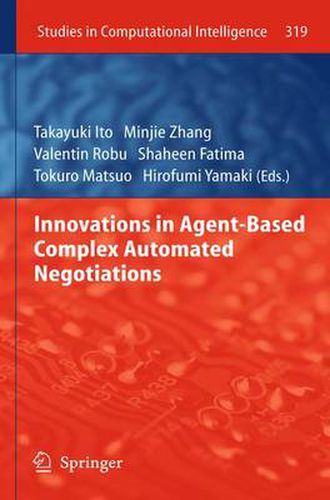Readings Newsletter
Become a Readings Member to make your shopping experience even easier.
Sign in or sign up for free!
You’re not far away from qualifying for FREE standard shipping within Australia
You’ve qualified for FREE standard shipping within Australia
The cart is loading…






This title is printed to order. This book may have been self-published. If so, we cannot guarantee the quality of the content. In the main most books will have gone through the editing process however some may not. We therefore suggest that you be aware of this before ordering this book. If in doubt check either the author or publisher’s details as we are unable to accept any returns unless they are faulty. Please contact us if you have any questions.
Complex Automated Negotiations have been widely studied and are becoming an important, emerging area in the field of Autonomous Agents and Multi-Agent Systems. In general, automated negotiations can be complex, since there are a lot of factors that characterize such negotiations. These factors include the number of issues, dependency between issues, representation of utility, negotiation protocol, negotiation form (bilateral or multi-party), time constraints, etc. Software agents can support automation or simulation of such complex negotiations on the behalf of their owners, and can provide them with adequate bargaining strategies. In many multi-issue bargaining settings, negotiation becomes more than a zero-sum game, so bargaining agents have an incentive to cooperate in order to achieve efficient win-win agreements. Also, in a complex negotiation, there could be multiple issues that are interdependent. Thus, agent’s utility will become more complex than simple utility functions. Further, negotiation forms and protocols could be different between bilateral situations and multi-party situations. To realize such a complex automated negotiation, we have to incorporate advanced Artificial Intelligence technologies includes search, CSP, graphical utility models, Bays nets, auctions, utility graphs, predicting and learning methods. Applications could include e-commerce tools, decision-making support tools, negotiation support tools, collaboration tools, etc.
In this book, we solicit papers on all aspects of such complex automated negotiations in the field of Autonomous Agents and Multi-Agent Systems. In addition, this book includes papers on the ANAC 2010 (Automated Negotiating Agents Competition), in which automated agents who have different negotiation strategies and implemented by different developers are automatically negotiate in the several negotiation domains. ANAC is one of real testbeds in which strategies for automated negotiating agents are evaluated in a tournament style.
$9.00 standard shipping within Australia
FREE standard shipping within Australia for orders over $100.00
Express & International shipping calculated at checkout
This title is printed to order. This book may have been self-published. If so, we cannot guarantee the quality of the content. In the main most books will have gone through the editing process however some may not. We therefore suggest that you be aware of this before ordering this book. If in doubt check either the author or publisher’s details as we are unable to accept any returns unless they are faulty. Please contact us if you have any questions.
Complex Automated Negotiations have been widely studied and are becoming an important, emerging area in the field of Autonomous Agents and Multi-Agent Systems. In general, automated negotiations can be complex, since there are a lot of factors that characterize such negotiations. These factors include the number of issues, dependency between issues, representation of utility, negotiation protocol, negotiation form (bilateral or multi-party), time constraints, etc. Software agents can support automation or simulation of such complex negotiations on the behalf of their owners, and can provide them with adequate bargaining strategies. In many multi-issue bargaining settings, negotiation becomes more than a zero-sum game, so bargaining agents have an incentive to cooperate in order to achieve efficient win-win agreements. Also, in a complex negotiation, there could be multiple issues that are interdependent. Thus, agent’s utility will become more complex than simple utility functions. Further, negotiation forms and protocols could be different between bilateral situations and multi-party situations. To realize such a complex automated negotiation, we have to incorporate advanced Artificial Intelligence technologies includes search, CSP, graphical utility models, Bays nets, auctions, utility graphs, predicting and learning methods. Applications could include e-commerce tools, decision-making support tools, negotiation support tools, collaboration tools, etc.
In this book, we solicit papers on all aspects of such complex automated negotiations in the field of Autonomous Agents and Multi-Agent Systems. In addition, this book includes papers on the ANAC 2010 (Automated Negotiating Agents Competition), in which automated agents who have different negotiation strategies and implemented by different developers are automatically negotiate in the several negotiation domains. ANAC is one of real testbeds in which strategies for automated negotiating agents are evaluated in a tournament style.